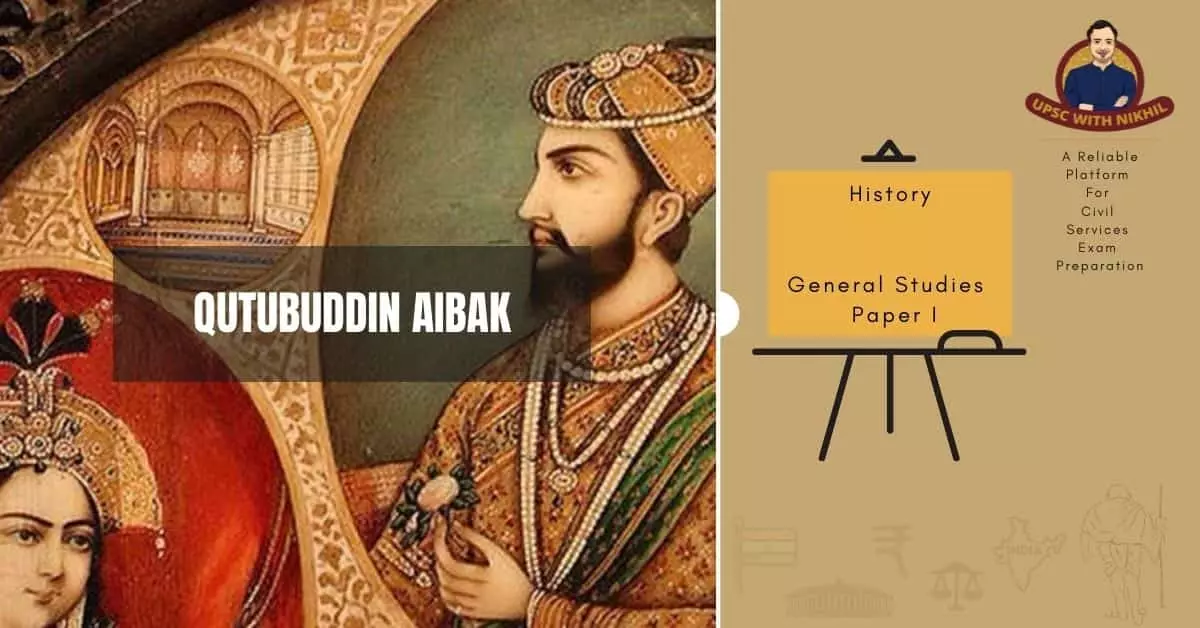Qutubuddin Aibak
Qutubuddin Aibak was a general in the Ghurid army in India who lived from around 1150 to 1210 CE. He was a slave who rose through the ranks to become India's first Muslim king and the founder of Muslim rule. Qutubuddin Aibak was the first ruler of the Delhi Sultanate and the founder of the Slave dynasty in medieval India. He was of Turkish origin from the Aybak tribe and reigned for only four years (1206-1210).
PERSONAL LIFE:
- As a child, Qutubuddin Aibak was kidnapped and sold as a slave to the chief Qazi of Nishapur, a town in northeastern Iran. The Qazi treated him well and provided him with a good education, including archery and horsemanship training. However, when the master died, his envious sons sold Qutubuddin Aibak to a slave trader who eventually sold him to Sultan Muhammad Ghori, the ruler of Ghor in central Afghanistan. Qutubuddin Aibak ascended to the rank of General and became one of Sultan Ghori's most trusted nobles.
- Because Muhammad Ghori lacked a son, he divided his vast empire among his nephews and loyal lieutenants. Qutb-ud-din Aibak was primarily responsible for the conquests of northern India, which aided Ghori in consolidating his position there. Mu'izz ad-Din (Ghori) made Aibak in charge of his Indian territories after the Ghurid victory in the Second Battle of Tarain in 1192. Aibak increased Ghurid's power in northern India by conquering and raiding the kingdoms of Chahamana, Gahadavala, Chaulukya, Chandela, and others.
- He is credited with being the true founder of Turkish rule in India, as he severed his ties with Ghazni and Ghur after Muhammad Ghori's death. By the time he became Sultan of Delhi, he was completely self-sufficient. As a result, he is rightfully regarded as Delhi's first Turkish Sultan. Qutb-ud-din Aibak died in an accident while playing polo in 1210. He was badly hurt when he fell from his horse and was laid to rest near the Anarkali bazaar in Lahore.
- Aram Shah succeeded Aibak, and then Iltutmish, his former slave, transformed India's loosely held Ghurid territories into the powerful Delhi Sultanate. Aibak is best known for commissioning the Delhi Qutb Minar and Ajmer's Adhai Din Ka Jhonpra.
QUTB-UD-DIN AS A RULER OF DELHI:
- Qutb-ud-din was the first Turkish Sultan of Delhi who took over the throne in 1206. He faced many challenges both inside and outside the country. His Turkish officers were envious of him, and the Rajputs were waiting for an opportunity to strike. Also, Taj-ud-din Yeldoz and Nasir-ud-din Qubacha were two other contenders for the Delhi throne. Nevertheless, two other nobles, Baha-ud-din Tughril Khan and Bakhtiyar Khalji, who were also contenders for the throne, were already dead.
- Khwarizm Persia's ruler, Shah Ala-ud-din Muhammad, posed a significant threat to him from the outside. However, Qutb-ud-din decided to remain independent of Central Asian policies. He fortified his position in Delhi and Lahore and tried to persuade some Turkish nobles to submit to him. He secured their support by marrying his sister to Qabacha and his daughter to Iltutmish. Yeldoz refused to accept his claim to Delhi, but Qutb-ud-din managed to win the battle.
- Qutb-ud-din had to deal with some internal issues too. Some Khalji nobles dethroned and imprisoned Ali Mardan Khan, the ruler of Bengal and Bihar, and offered the throne to Muhammad Sheran. However, Ali Mardan escaped and asked Qutb-ud-din to intervene. Rumi Khan won the Khalji nobles of Bengal through a combination of force and diplomacy and persuaded them to appoint Ali Mardan as governor of Bengal under Delhi's Suzerainty. As a result, Ali Mardan agreed to pay Qutb-ud-din an annual tribute.
- Qutb-ud-din could not continue his kingdom's expansion policy as he had to defend his independence. His main concerns were affairs in the northwest and Bengal. Therefore, he spent most of his time in Lahore rather than Delhi. However, his reign did not last long. In 1210 A.D., he fell from his horse while playing polo and died soon after.
Qutb-ud-din Aibak was the first of the Slave Dynasty of India, which lasted until 1290. The Sultanate lasted until 1526 when it was succeeded by the Moghul Empire, which lasted until 1857. Aibak was a loyal, generous, courageous, and just man who was praised by all contemporary chroniclers. His generosity earned him the nickname lakh-bakhs, which means "giver of lakhs," according to Minhaj.


